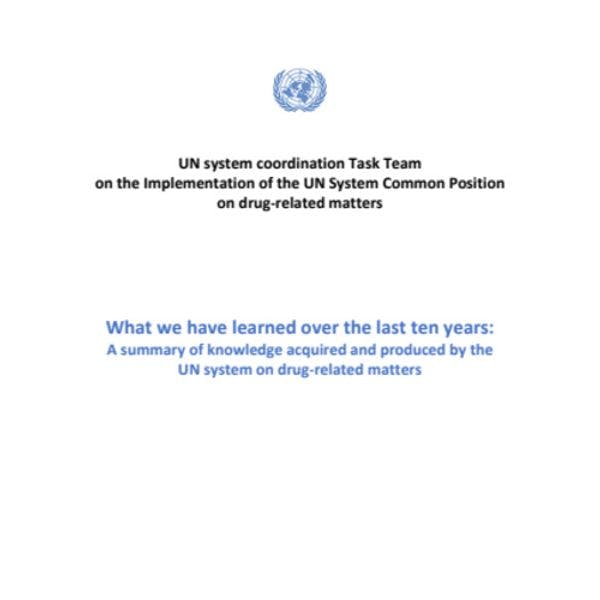Lo que hemos aprendido estos últimos diez años: resumen de los conocimientos adquiridos y producidos por el sistema ONU en materia de drogas
Un grupo de trabajo de la ONU analiza el impacto de las políticas de drogas y ofrece recomendaciones para mejorar su implementación. Más información, en inglés, está disponible abajo.
Drug markets are evolving at unprecedented speed. The range of substances and combinations available to users has never been wider, and the amounts produced have never been greater. Cultivation and manufacturing of heroin and cocaine have reached record highs, synthetic drugs continue to expand, and the market for new psychoactive substances (NPS) remains widely diversified with a growing interplay with traditional drug markets. The non-medical use of regulated prescription drugs (either diverted from licit channels or illicitly manufactured) is becoming a major threat: in addition to the ongoing opioid epidemic in North America, there are signs of an opioid epidemic due to the non-medical use of tramadol in North and subSaharan Africa, as well as in the Middle East. Drug-related deaths are on the rise. At the same time, access to controlled drugs for medical purposes remains a dramatic problem in most lowand middle-income countries.
Reasons for blooming drug markets are complex and diversified. A combination of poverty, limited social and economic opportunities of rural communities, political instability, lack of government control, and changed strategies of trafficking organizations has driven the high level of illicit crop cultivation. There remain multiple factors at individual, micro and macro level that affect the vulnerability to drug use and its path to harmful use. While progress has been made by some countries to increase the accessibility to human-rights and evidencebased policy interventions, challenges remain with insufficient investment and implementation of schemes to prevent, treat and reduce the potential harms posed by drug use. In contrast to an increasing trend of donors’ commitment for overall international assistance, assistance in the sectors of alternative development and “narcotics control” has significantly declined since 2008. 1 Punitive drug policies continue to be used in some communities, despite being ineffective in reducing drug trafficking or in addressing non-medical drug use and supply, and continue to undermine the human rights and well-being of persons who use drugs, as well as of their families and communities.
The SDG 2030 Agenda is putting the dignity, health and rights of people and planet at the centre of sustainable development.
Drug matters are intertwined with all aspects of sustainable development. All areas of the 17 Sustainable Development Goals shape the nature and dynamic of the drug problem. At the same time, the impact of the drug problem and the response thereto on development can be observed at individual, community and national levels. For example, ensuring healthy lives and promoting well-being for all (SDG 3) requires effective measures to address the world drug problem, while the lucrative drug trade compounds corruption risk and undermines responsive, accountable and transparent institutions at all levels (SDG 16).
When well-designed drug policy interventions directly or indirectly result in an improvement in the level of development of their target populations, operations designed to improve sustainable development can address the vulnerability of people or communities affected by the drug problem and can ultimately help address it. However, if not based on human rights standards and a solid evidence base, drug policies can have a counterproductive effect on development. Abusive, repressive and disproportionate drug control policies and laws are counterproductive, while also violating human rights, undercutting public health and wasting vital public resources.
The outcome document of UNGASS 2016 highlighted the need to strengthen cooperation among UN entities in their efforts to address the world drug problem, and the need to promote the protection of and respect for human rights by supporting Member States in the implementation of the operational recommendations contained in that document. On 7 November 2018, members of the Chief Executives Board for Coordination (CEB) committed to supporting each other’s activities so as to deliver a “truly balanced, comprehensive, integrated, evidence-based, human rights-based, development-oriented and sustainable support to Member States in implementing joint commitments to address the world drug problem, including the operational recommendations contained in the outcome document of the 2016 UN General Assembly Special Session on the World Drug Problem”. The CEB also established a UN system coordination Task Team composed of all interested UN entities and led by UNODC, for the purposes of coordinating data collection to promote scientific, evidencebased implementation of international commitments.
Descargas
Temas
- 2016 UNGASS
- Segmento Ministerial de 2019
- Medios de vida alternativos
- Estimulantes de tipo anfetamínico
- Participación de la sociedad civil
- Justicia penal
- Cultivo de plantas consideradas ilegales
- Descriminalización
- Reducción de la demanda
- Reducción de daños
- Datos e indicadores
- Nuevas sustancias psicoactivas
- Reducción de la oferta
- Violencia, acción policial y castigo
- Desarrollo y medio ambiente
- Descriminalización, regulación y reforma
- Salud y reducción de daños
- Derechos humanos y justicia social
